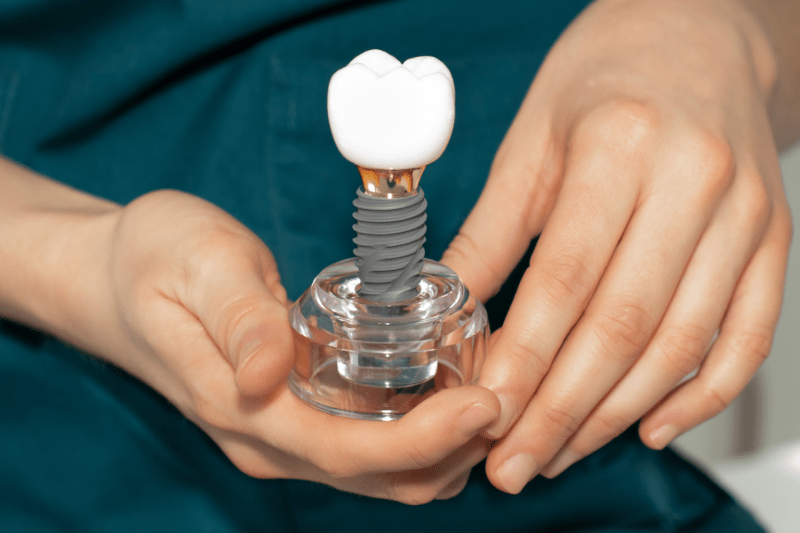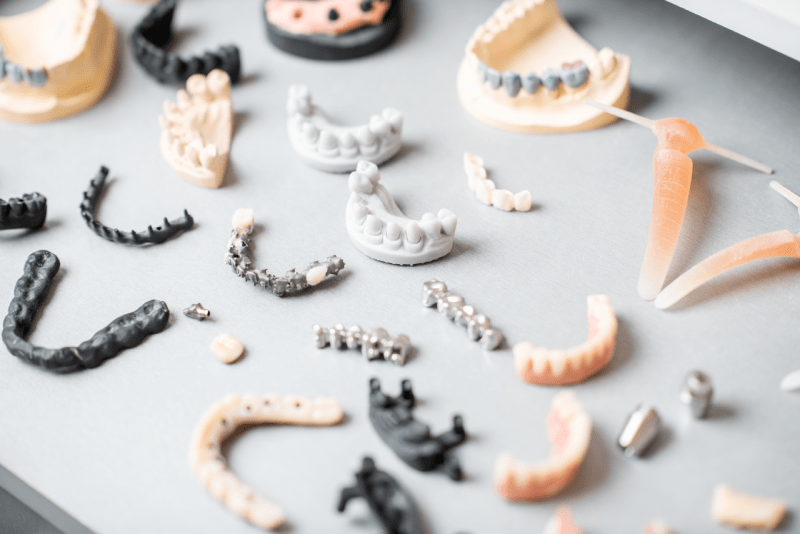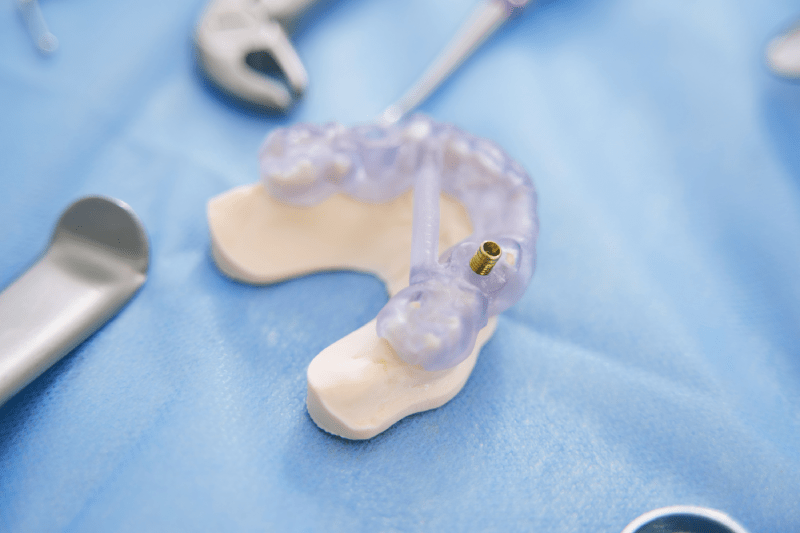What Are Dental Implant Prices in Nottingham?
Dental implant prices vary depending on the complexity of the treatment and the quality of the materials used. In Nottingham, the cost of a single implant generally starts at around several thousand pounds. However, this price reflects a total package that includes the surgical procedure, the implant itself, and the cost of the prosthesis to be placed on it. Since every patient’s situation is different, a comprehensive evaluation must be done first to get a final price. Like many other treatments, dental implants are an investment.
What Factors Affect The Cost Of Dental Implants?
There are many factors that affect the cost of dental implants. These include the bone density in the area where the implant will be placed and the patient’s overall oral health. If there is insufficient bone, an additional bone graft or a sinus lift operation may be required, which increases the total cost. In addition, the brand of the implant, the material of the crown to be placed on the implant, and the experience of the specialist who will perform the treatment are also important factors that determine the price. More complex cases generally result in higher costs.
How Is The Dental Implant Treatment Process Carried Out?
The dental implant treatment process usually consists of several stages. First, a comprehensive examination and radiological evaluation are performed. Then, the implant is placed into the jawbone under local anesthesia. After this surgical stage, a few months are awaited for the implant to fuse with the bone (osseointegration). When the healing is complete, a permanent abutment and a custom-designed crown are placed on the implant. This process may vary depending on the patient’s condition and healing rate, but it is generally spread over a timeline of several months.
Is It Logical To Go From The UK To Turkey For Dental Implants?
Going from the UK to Turkey for dental implant treatment is a very logical option for many patients. The biggest reason for this is that the cost of dental implants in Turkey is much more affordable compared to the UK. There is also no compromise in terms of quality. Clinics in Turkey use modern technology and provide a high-level treatment experience to their patients with services that meet international standards. The cost savings, including flights, accommodation, and holiday expenses, still make the total package very attractive. This situation also increases the popularity of health tourism.
How Many Visits Are Required For An Implant In Nottingham?
The number of visits required for a dental implant treatment in Nottingham generally depends on the complexity of the treatment. For a standard implant operation, a minimum of two or three visits may be required. The first visit includes stages such as the placement of the implant, and the second visit includes the placement of the crown at the end of the healing process. If additional procedures such as bone grafting are required, this number of visits may increase. Additional check-ups can also be planned to monitor the healing process, which shapes the treatment process according to the personal situation.

Is Dental Implant Treatment Painful?
Contrary to popular belief, dental implant treatment is not a painful process. Since local anesthesia is applied during the surgical procedure, no pain is felt. After the procedure, there may be some minor discomfort, swelling, or bruising, but these can usually be controlled with over-the-counter pain relievers. During the healing process, most patients can return to their normal daily activities in a short time. Proper planning and application by an expert team make the treatment process very comfortable.
What Are The Most Important Advantages Of Having A Dental Implant?
The most important advantages of having a dental implant include providing the closest aesthetic and function to natural teeth. Implants restore chewing power, improving eating and speaking abilities. They also fill the missing tooth gap without damaging the adjacent teeth and help preserve facial features by preventing bone resorption that may occur in the jawbone. When properly maintained, dental implants can provide lifelong durability, thus offering a long-term economic solution.
How Do Dental Implants Work?
Dental implants are small screws made of titanium that replace missing tooth roots. These screws are placed into the jawbone and biologically fuse with the bone (osseointegration). When this process is complete, the implants form a solid foundation for the artificial teeth. The porcelain crowns placed on top complete the appearance and function of the implant. This structure acts like the roots of natural teeth, evenly distributing chewing force and preserving jawbone health.
Who Is An Ideal Candidate For Implant Application?
An ideal candidate for implant application is an individual in good general health and with sufficient bone density. People with chronic diseases such as diabetes or who smoke can also be suitable candidates, but these conditions may affect the treatment plan. Implant treatment is suitable for adults of all ages who are missing teeth and are looking for aesthetic or functional improvement. The candidacy status can be definitively determined with a comprehensive examination.
What Should The Care Be After Dental Implant Treatment?
Proper care after dental implant treatment is critical for the success and longevity of the implant. Implants, just like natural teeth, should be brushed regularly and flossed. Specially designed interdental brushes can also be useful for cleaning debris around the implant. In addition, it is important to go for regular dental check-ups and to detect possible problems early. Eating soft foods and staying away from smoking supports the healing process.
What Is The Lifespan Of Dental Implants?
The lifespan of dental implants varies depending on the quality of the materials used, the patient’s oral hygiene, and regular check-ups. With good oral care and regular dental visits, implants can last a lifetime. The crowns placed on the implant may need to be renewed over time due to wear, but the implant itself remains durable. Long-term success depends on the patient’s individual care and lifestyle habits.
Do Dental Implants Look Different From Natural Teeth?
With proper planning and application, dental implants offer an appearance that is indistinguishable from natural teeth. The crowns placed on the implant are specially designed to match the color, shape, and size of the patient’s other teeth. In this way, an aesthetic integrity is achieved, and the presence of the implant is not noticeable. Dental implants are designed to perfectly mimic the aesthetics and function of natural teeth, especially in cases of a single missing tooth.
What Happens If A Dental Implant Fails?
Dental implant failure is a rare occurrence, but it can happen in some cases. The most common reasons are insufficient fusion with the bone or the development of an infection. If an implant fails, it is usually removed, the area is allowed to heal, and a new implant can be placed depending on the situation. Most cases of failure can be successfully treated by an expert re-evaluation.
Is There A Minimum Age For Dental Implant Application?
There is no upper age limit for dental implant application; any adult in good general health can have an implant. However, there is a lower age limit. Since the jawbone must have completed its development, it is generally suitable for individuals aged 18 and over. The dentist will evaluate the individual’s bone structure and general health to determine the most appropriate treatment timing.
What Are The Additional Costs For Dental Implants?
Additional costs that may arise in addition to dental implant prices are generally due to additional procedures before or during the treatment. For example, procedures such as bone grafting, sinus lift operation, or tooth extraction may incur additional costs. In addition, the initial examination and X-ray fees may not be included in the total price. Therefore, it is important to request a detailed breakdown of all possible costs before starting treatment.
What Is The Cost Of A Single Dental Implant?
The cost of a single dental implant depends on the complexity of the treatment, the brand of the implant, and the type of crown to be placed on it. Prices in Nottingham generally start at an average of several thousand pounds. This price is considered a package covering the surgical procedure, the implant, and the crown. It should be noted that each case is individual and the cost may increase if additional procedures such as bone grafting are required.
Do Prices Change For Multiple Dental Implants?
When more than one dental implant is needed, the total cost is generally not calculated as a multiple of the price of a single implant. Many clinics can offer discounted package prices for multiple implants. This is due to both efficiency in the surgical process and savings in laboratory costs. Especially in cases such as full mouth implants, special pricing and flexible payment plans can be applied.
What Is The All-On-4 Dental Implant And What Is Its Cost?
The All-on-4 dental implant technique is a treatment that allows an entire dental arch to be fixed on four specially positioned implants placed in the jawbone. This method addresses more tooth deficiencies with fewer implants than traditional implants. The All-on-4 technique can often be more cost-effective compared to full mouth implants. Since this special technique is planned according to the patient’s condition, costs vary.
What Is Done Before The Implant Operation?
Before the implant operation, the patient’s oral and general health status is examined in detail. The condition of the jawbone, the location of the sinus cavities, and the route of the nerves are determined with techniques such as panoramic X-rays and 3D imaging (tomography). In light of this data, a personalized treatment plan is created. The dentist listens to the patient’s expectations and explains the possible risks and benefits. This preparation process is vital for the success of implant treatment.
Are There Different Payment Plans For Dental Implants?
Many dental clinics offer flexible payment plans for patients for high-cost treatments such as dental implants. These plans generally aim to make the treatment cost less burdensome on patients’ budgets by dividing it into installments. Some clinics may also provide loan facilities through contracted finance companies. These options make treatment more accessible. Different clinics determine their own payment policies.
What Is The Insurance Coverage For Dental Implant Treatment?
Private dental insurance in Nottingham may cover part or all of the dental implant treatments. This depends on the details of your insurance plan. In general, basic implant surgery may be included in the coverage, while crowns for aesthetic purposes or additional procedures may be excluded from insurance coverage. Before starting treatment, it is important to contact your insurance company to find out what expenses are covered.
What Should Be Considered When Choosing A Dental Clinic In Nottingham?
The most important factors to consider when choosing a dental clinic in Nottingham include the experience of the doctor and the technology used. The sterilization standards of the clinic, patient reviews, and the scope of the service offered should also be considered. Clinics that offer a free or affordable preliminary examination can provide you with clear information about the treatment plan and cost. Expertise and references will help you make the right choice.

Can Patients With Bone Loss Have Implants?
Patients with bone loss can have dental implants, but this situation usually requires additional procedures. Bone grafting, which is the addition of bone powder or bone fragments taken from another part of the body to the area where the implant will be placed, is the most common solution. Sinus lift surgery can also be applied in cases of insufficient bone in the upper jaw. These additional procedures provide the necessary foundation for the implant to be placed firmly.
What Are Dental Implant Materials?
Dental implants are generally made of titanium. Since titanium is a biocompatible metal, it is easily accepted by the human body and can integrate with the bone. In some cases, zirconium implants may also be preferred. Zirconium can be a good alternative for patients with metal allergies. The crowns placed on the implant are generally made of aesthetic and durable materials such as porcelain or zirconium.
Do Dental Implants Harm Other Teeth?
Unlike other methods such as bridges, dental implants do not harm adjacent teeth to fill missing tooth gaps. In bridge treatment, the healthy teeth on both sides of the missing tooth need to be reduced to support the prosthesis. Implants, on the other hand, act as an independent root on their own, so the structure of the adjacent teeth is not disrupted. This is one of the most important protective features of dental implants.
How Long Does Dental Implant Treatment Take?
Dental implant treatment varies depending on the patient’s general condition, healing rate, and the presence of additional surgical procedures. Generally, it takes 3 to 6 months for the implant to fuse with the bone after placement. This process is called osseointegration. Once healing is complete, the final prosthesis or crowns are placed. This process can take from a few months to a year in total.
Do Dental Implants Restore Chewing Power?
Yes, dental implants restore chewing power to almost the same level as natural teeth. Since implants are firmly attached to the jawbone, they allow you to chew food in the same way as with natural teeth. This also has a positive effect on digestive health. In addition, since the implants have a fixed structure, they do not move, which provides the user with a comfortable and safe chewing experience.
Is There Swelling Or Bruising After Dental Implant Surgery?
Slight swelling and bruising after dental implant surgery are normal and expected. These side effects generally reach their highest level within 24-48 hours after the operation and begin to decrease within a few days. Applying a cold compress and using the pain relievers recommended by the physician help to alleviate these symptoms. Following the instructions carefully after the operation speeds up the healing process.
Do Dental Implants Affect Speech?
Dental implants have a positive effect on speech. Missing teeth can prevent some sounds from being pronounced correctly during speech. Implants fill these gaps, allowing for correct tongue and lip movements. When the treatment is complete, since the implants feel like natural teeth, there will be no negative changes in your speech ability. On the contrary, the negativities created by missing teeth are eliminated and the patient’s self-confidence increases.
What Is The Best Time For A Dental Implant In Nottingham?
The best time to have a dental implant is when your general health is good and your bone structure is suitable. It is also important that you have the necessary time for the healing process. In general, there are no seasonal restrictions. The important thing is for your physician to determine the most suitable treatment timeline for you by making a comprehensive evaluation. This planning is critical for both the success of the operation and the patient’s comfort.
Why Is Implant Treatment More Economical In Turkey?
The main reason why implant treatment is more economical in Turkey is that the general cost of living and surgical costs are lower compared to the UK. In addition, the currency exchange rate advantage plays an important role. This allows for the same quality of service to be offered at much more affordable prices. Clinics in Turkey provide high-quality service by using the most modern technology and working with experienced specialists.
Do Dental Implant Clinics In Turkey Provide English-Speaking Service?
Many dental clinics in Turkey, especially those working for health tourism, have English-speaking staff to serve international patients. Most clinics have English-speaking coordinators, doctors, and nurses to facilitate your treatment process. This eliminates communication barriers and ensures that your treatment process is smoother and more comfortable.
Is A Visa Required To Have Dental Implants In Turkey?
UK citizens generally do not need a special visa to receive dental implant treatment in Turkey. Most international patients can enter Turkey within the scope of a tourist trip. Visa requirements may vary depending on the country of which the person is a citizen, so it is important to check the current visa rules before making travel plans.
How Are Travel And Accommodation Arranged In Turkey?
Travel and accommodation arrangements for dental implant treatment in Turkey can usually be included in the treatment package. Many health tourism companies offer services such as airport transfers, transportation between the clinic and the hotel, and even contracted hotels for accommodation. These services simplify the entire process for the patient and allow them to focus on the treatment.
How Is Accommodation Provided During Dental Implant Treatment?
Accommodation during dental implant treatment is usually included in the treatment package or provided at contracted hotels outside the package. Health tourism companies book rooms in hotels that are centrally located or close to the clinic, keeping in mind the comfort and needs of the patients. This service ensures that patients do not experience accommodation stress during the treatment process.
Why Get Dental Implant Treatment With Cure Holiday?
Cure Holiday is a health tourism consultancy company specializing in dental implant treatment in Turkey for patients in Nottingham. By creating the most suitable treatment plan specifically for you, it offers both a cost advantage and high-quality service. Cure Holiday helps you with all your travel arrangements, such as flights, accommodation, and transfers, and plans your treatment process from start to finish. If you are looking for a high-quality and economical dental implant treatment, Cure Holiday will offer you the best solution. You can contact Cure Holiday to get more information and create your personal treatment plan.


